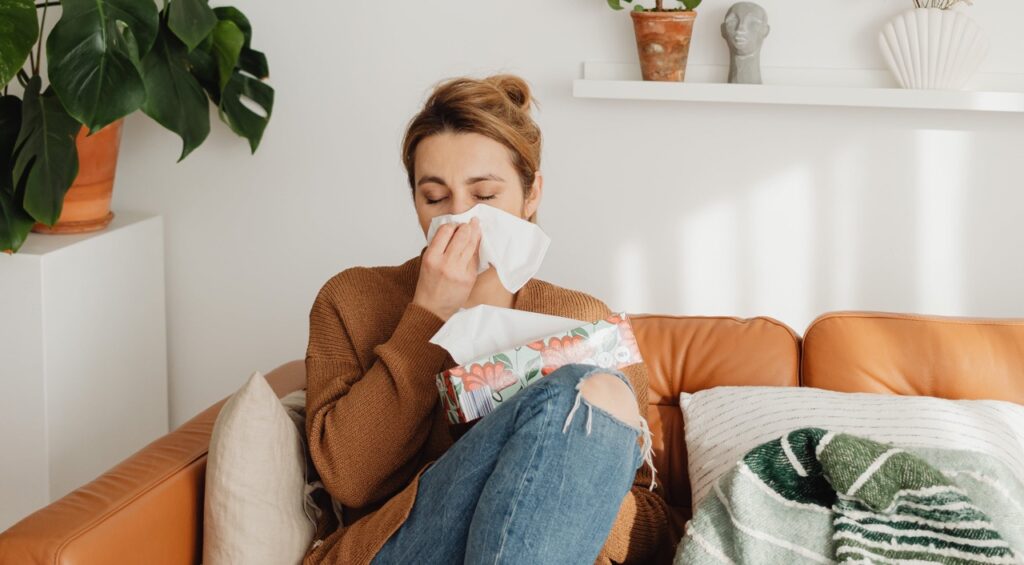Health Conditions
Do Allergies Cause Hair Loss
While most individuals are aware of the usual allergy symptoms, many are ignorant of the possible link between allergies and hair loss. Hair loss, also known as alopecia, is an unpleasant disorder that affects both men and women. The most prevalent type of hair loss is androgenetic alopecia, sometimes referred to as male or female pattern baldness. However, allergens can also cause hair thinning and even bald patches.
Allergies are caused by the body’s immune system reacting abnormally to normally harmless chemicals. When exposed to an allergen, such as pollen, pet dander, or specific foods, the immune system produces histamines, which set off a series of symptoms. These symptoms can range from moderate to severe and include sneezing, itching, nasal congestion, and watery eyes.

Types of Hair Loss and Their Causes
Before digging into the relationship between allergens and hair loss, it is critical to understand the various forms of hair loss and their causes. Hair loss is divided into two types: scarring and non-scarring alopecia.
Scarring alopecia is the permanent damage of hair follicles, which can cause irreversible hair loss. This kind of alopecia is frequently caused by disorders like lichen planopilaris, discoid lupus erythematosus, or folliculitis decalvan.
In contrast, non-scarring alopecia causes transient or reversible hair loss. Several causes can contribute to this sort of hair loss, including hormonal fluctuations, nutritional deficiencies, stress, drugs, and, yes, allergies.
Allergies and Hair Loss: Is There a Connection?
While the exact mechanisms underlying the association between allergens and hair loss are not fully known, there is evidence that some allergies can contribute to hair thinning and bald patches. When you have an allergic reaction, your body produces histamines, which induce inflammation. This inflammation may alter the hair growth cycle, resulting in hair loss.
Furthermore, some people may have allergic responses to hair care products like shampoos or dyes. These allergic responses can cause an itchy or irritated scalp, which can lead to more hair loss. It’s important mentioning that not everyone who has allergies will have hair loss. Allergies affect hair growth to varying degrees.

Allergies That Commonly Cause Hair Loss
While any allergy can cause hair loss, some allergens are more typically associated with this side effect. Allergic reactions to pollen, cat dander, or particular foods are rarely the direct cause of hair loss. However, the accompanying inflammation and immunological reaction can have an indirect effect on hair development.
Allergic contact dermatitis is one type of allergy linked to hair loss. This happens when the body’s immune system reacts to a particular material that comes into touch with the skin, such as some hair care products or metals found in hair accessories. The resultant inflammation can damage hair follicles, causing hair loss in the affected areas.
Managing Allergies to Prevent Hair Loss
If you feel that your hair loss is due to allergies, you should see a dermatologist or allergist. They can help you understand the underlying reason of your hair loss and prescribe the best treatment alternatives. In rare circumstances, controlling and treating allergens might help reduce or reverse hair loss.
To effectively manage allergies, identify and avoid triggers. This could include adopting lifestyle modifications, such as closing windows during high pollen seasons or purchasing hypoallergenic bedding. Furthermore, allergy treatments, such as antihistamines or nasal sprays, might help relieve symptoms and reduce inflammation, potentially protecting against hair loss.

Treating Hair Loss Caused by Allergies
Treating hair loss caused by allergies usually entails addressing both the underlying allergy and the associated inflammation. If a certain hair care product is producing an allergic reaction, it must be discontinued promptly and replaced with hypoallergenic alternatives.
In cases of severe hair loss, physicians may prescribe topical corticosteroids to decrease inflammation and encourage hair regeneration. These drugs decrease the immune response and reduce inflammation, which can harm hair follicles. In severe situations, oral drugs or injections may be recommended.
Tips for Maintaining Healthy Hair While Managing Allergies
While managing allergies and preventing hair loss, there are various steps you can do to keep your hair healthy. To begin, it is critical to eat a balanced diet rich in nutrients that promote hair development. Foods high in vitamins A, C, D, and E, as well as biotin and omega-3 fatty acids, can help maintain healthy hair and scalp.
Furthermore, maintaining healthy hair care routines is critical. Choose mild shampoos and conditioners that do not contain common allergies or harsh chemicals. Avoid using too much heat on your hair and wearing tight hairstyles, which can cause stress on your scalp. Finally, be cautious about any new hair care products you introduce, and discontinue use if you notice any signs of an allergic response.
Conclusion
Dealing with allergies has been more than just a nuisance for me; it has brought about unexpected consequences like hair loss. Recognizing the connection between allergies and hair loss has empowered me to take proactive steps to address the issue and restore my hair’s health.
If you find yourself in a similar situation, I highly recommend seeking professional advice from a dermatologist or allergist. They can help identify the underlying cause of your hair loss and provide suitable treatment options. Through effective allergy management and adopting healthy hair care practices, I’ve learned to minimize the impact of allergies on my hair, allowing me to maintain a luscious and healthy mane.
Trusted Health, Wellness, and Medical advice for your well-being


